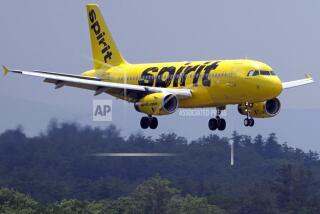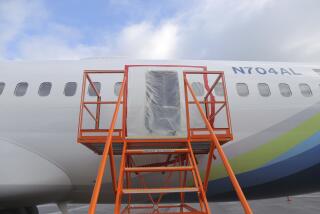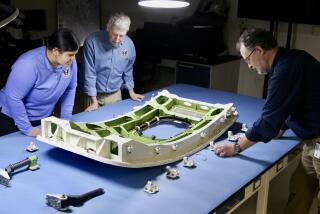Northwest Seems to Be Weathering Turbulence
- Share via
Northwest Airlines Corp. just might be the most hated airline in the country right now--and one with perhaps the brightest prospects.
The carrier’s financial performance and reputation, not to mention its stock price, took a beating last year amid the collapse of Asia’s economies--Northwest is a leading U.S. airline to Japan--and labor disruptions that included a 15-day pilots’ strike last summer.
Matters only got worse in January, when thousands of Northwest passengers were stranded for hours on runways in Detroit during a blizzard. The incident drew enormous publicity and turned the airline into the poster child for consumer activists and politicians pressing for “passenger rights” legislation in Washington.
“All of us realize that the last 18 months have been awful for our passengers and for us,” said Northwest spokesman Jon Austin.
Now, though, the turbulence surrounding the nation’s fourth-largest airline is easing, and the potential for Northwest’s recovery is growing.
Minneapolis-based Northwest has signed a new contract with its pilots and reached a tentative pact with its flight attendants. Economies in Japan and elsewhere in Asia seem to be improving, albeit slightly, and U.S. regulators recently awarded Northwest six more weekly flights to China.
The carrier’s domestic business is starting to reap the benefits of Northwest’s alliance with Continental Airlines, which involves sharing their route networks and frequent-flier programs. And some analysts are now touting Northwest’s stock, which has outpaced its industry peers in recent months.
“Northwest has also continued to show dramatic improvements in its operating performance,” mainly with on-time departure and arrival figures that are at or near the top of its peer group, said Brian Harris, an analyst with Salomon Smith Barney Inc. who upgraded Northwest’s stock to a “buy” earlier this month.
After taking a 47% drubbing last year, Northwest’s stock has jumped 22% since March 1, whereas the American Stock Exchange’s index of the leading airline stocks has fallen 2%. Shares of UAL Corp.--the parent of United Airlines, the other major U.S. carrier to Asia--are nearly unchanged since March 1. Northwest’s stock closed Friday at $31.25 a share, down 75 cents for the day, on Nasdaq.
Northwest operates about 1,700 daily flights to more than 150 cities in nearly two dozen countries. Its hub airports are in Minneapolis/St. Paul, Detroit, Memphis and Tokyo, and Northwest has been flying to Asia for more than 70 years.
Northwest also was a full-fledged participant in the airline industry’s prosperity in the mid-1990s. It chalked up a record profit of $597 million in 1997 even though, at the time, Northwest was often low on the industry’s list for on-time performance and high on its list for customer complaints. (Indeed, there’s still at least one Internet site solely devoted to decrying the service at Northwest, and critics have long dubbed the airline “Northworst.”)
The earnings growth abruptly vanished last year with the Asian economic crisis and the pilots’ strike, and Northwest ultimately lost $286 million for 1998 on revenue of $9 billion. The airline then lost an additional $29 million in this year’s first quarter.
But Northwest should return to the black starting with this year’s second quarter, in good part because of strong bookings for transatlantic travel and the slight improvement in Asia, analysts forecast.
“There are definitely signs of life in Asia,” said Northwest’s Austin. Japan is still struggling, “but even with Japan there’s some good news for us in that the situation is not worsening,” he said.
Indeed, Japan recently announced that its economy grew an unexpectedly strong 1.9% in the first quarter, snapping five straight quarters of decline and fueling further gains in Japan’s stock market.
But the economies of Japan and other Asian nations are still far from healthy, and that’s just one reason Northwest itself remains a troubled airline.
Northwest has yet to reach a new contract with its 10,000 mechanics. The airline also flies one of the oldest fleets among U.S. airlines; its 400 planes are an average of 20 years old.
In addition, the new employee contracts that Northwest has signed are lifting its fixed costs just as U.S. passenger traffic is starting to slow industrywide, a situation that could squeeze profit margins. The slowdown also could prompt more fare cuts by the carriers to fill empty seats, further eroding earnings.
And the blizzard fiasco still hangs over Northwest. A Michigan state judge recently granted class-action status to lawsuits seeking damages from Northwest on behalf of the stranded passengers, a move that could cover about 8,000 customers and, if successful, could cost Northwest millions of dollars.
Northwest has conceded that it made mistakes in Detroit, and it has sent apologies and free tickets to the passengers involved. But it also contends the lawsuits have no merit.
(BEGIN TEXT OF INFOBOX / INFOGRAPHIC)
Taking Off
Northwest Airlines’ stock has been climbing amid signs that the carrier’s Asian woes, labor disruptions and service problems are dissipating. Weekly closes on Nasdaq:
Friday: $31.25, down 75 cents
Source: Bridge
More to Read
Inside the business of entertainment
The Wide Shot brings you news, analysis and insights on everything from streaming wars to production — and what it all means for the future.
You may occasionally receive promotional content from the Los Angeles Times.











